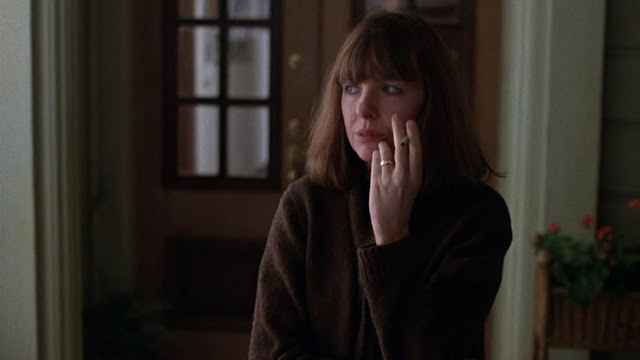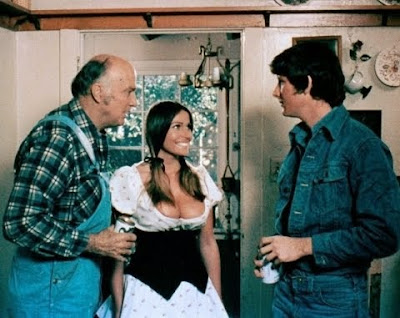Shoot the Moon
(Complete Spoilers)
To begin, let's consider the end of director Alan Parker's 1982 drama SHOOT THE MOON. The last scene frames an event so brazen, so utterly balls-to-the-wall you have to at least give George Dunlap (Albert Finney)some points for sheer chutzpah. We've just spent two hours with this smug, self-righteous prig, observing his berations of and asinine behavior towards his wife, Faith (Diane Keaton), but nonetheless we are rooting for him to win back her back. Even as we've learned that he has a mistress and more devotion to his career as an author than to his family. The Dunlaps' separation has not been amicable. There are also children involved. As we sit, drained after watching these two pull their hair out and search for any hurtful word they can utter, we are left looking for some sort of catharsis; we most certainly get it. George puts the accelerator to the floor and completely, entirely destroys the brand new tennis court that his wife's new beau, Frank (Peter Weller) has built behind the Dunlap domacile.
I watched this scene and cheered. Initial reaction. Then it sank in. Emotional reactions are primal, and tend to happen in microseconds. We usually can't process the implications of such actions so quickly. We remember certain information, the overall vibe. Whether our protagonist is a hero or antihero, at some level we want him/her to win. It's devious sometimes, like when Robert Altman had us hoping that Griffin Mill would literally get away with murder in THE PLAYER. We know that George is a jerk, unworthy of all the blessing with which he's been bestowed. But he's not painted that broadly. Maybe he's just awesomely flawed. Faith is not perfect, either, as she too is career driven in ways that leave their daughters often frustrated and neglected. We may not blame her for taking her own lover. Frank is younger, more energetic, but with flaws of his own. Actually, he's a prick. What does Faith see in him? Perhaps he's just a tool for jealousy.
These are my post viewing observations. Actually, I first saw this film quite a few years back. When we reach that climactic scene, we are just shouting in the peanut gallery with the other reptilian brained simpletons. Tear it down! George has donned his armor and taken the hill. His wife and family stand open mouthed. The movie ends. What could possibly happen next? Multitudes. Perhaps you can write screenwriter Bo Goldman and ask him what he thinks. Perhaps Faith will be sufficiently impressed. Maybe she will see through it? Maybe it was a genuine gesture? Maybe just immature? Other films that end with a visceral bit of come- uppance leave you feeling nothing but grimly satisfied. SHOOT THE MOON leaves you thinking about these characters. What will happen tomorrow? Any fiction that provokes me to think about its characters beyond the last page or the end credits has succeeded in some fashion. I was worried about these people. I'm not usually prone to getting that involved with fictional characters for so long after a movie has ended.
I did (and do) think a lot about this movie. How I felt about the characters, how it mirrored some of my experience. It was none too enjoyable watching this as a teen in similar circumstances. As an adult, it is more transparent, more applicable. This despite the failings of the screenplay, where many plot strands are left unresolved. Oddly, this was some of the same frustration I had with Parker's FAME from 1980. But, life doesn't always answer everything. Sometimes we go to our graves without knowing why something did or did not happen.
And what of the children? Sherry (Dana Hill), Molly (Tina Yothers), Marianne (Tracey Gold), and Jill (Viveka Davis) witness much of the emotional violence, hear the terseness through the walls late at night. Parker nails these scenes with great discomfort; anyone who heard their parents fight from across the house when you're trying to sleep (then crying yourself there in the process) will relate. Indeed, much of this film will rang of truth, even if dramatically things don't always quite make sense. If you examine the script closely, you will find holes.
What matters here, in my opinion, is how believably this oft told story is presented. Even if the script has some deficiencies, the acting and direction are often dynamite. Finney is his usual tower of fire. Keaton again knocked me out with her mercurial performance, truly complex. Her roles in the 70s and early 80s revealed an amazing talent. Faith is her best part since her incredible, heartbreaking turn in LOOKING FOR MR. GOODBAR, another powerful (and essential) film. The young ladies who play the daughters (Yothers was on Family Ties, Gold on Growing Pains, Hill and Davis also of many TV programs)are also terrific, totally believable as they are torn apart by their destructive parents.
Parker weighs in with his entry into the Suburban Angst Drama, that genre that includes great films like ORDINARY PEPLE and AMERICAN BEAUTY, and a whole lot of mediocre ones. He gets the look of tony Marin County California just right, enough to make it look like a cozy, slightly unreal place, totally incongruous with all the anger that will play out. More importantly, he lets his actors be these people. Perhaps the actors had experienced such trauma,and brought it to their preparations for these roles, perhaps not. It was all so natural, it just doesn't matter.



Comments